October 12, 2018
Air Date: October 12, 2018
FULL SHOW
SEGMENTS
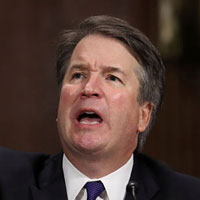
Kavanaugh On Environmental Law
View the page for this story
Newly-confirmed Supreme Court Justice Brett Kavanaugh brings a long record of pro-business and anti-regulatory opinions from his tenure on an appeals court. He will likely tip the high court’s balance in favor of narrower interpretations of environmental law, Vermont Law School Professor Pat Parenteau tells Host Steve Curwood. (09:37)
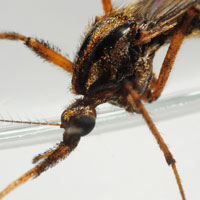
Beyond The Headlines
/ Peter DykstraView the page for this story
Peter Dykstra of Environmental Health News and Host Steve Curwood discuss the outbreak of gigantic, aggressive mosquitoes that erupted in North Carolina following Hurricane Florence. They also talk about the impact of endocrine disrupters such as BPA on declining human sperm counts before taking a trip through history to the start of the environmental justice movement in Warren County, North Carolina. (03:23)

Global Warming Is Heating Up
View the page for this story
A special report issued by the Intergovernmental Panel on Climate Change (IPCC) on October 8, 2018 spells out the need to move quickly to curtail global warming to no more than 1.5 degrees Celsius from pre-industrial levels, though the 2015 Paris Climate Agreement formally adopted 2°C as a target with 1.5°C as an “aspiration.” This IPCC report details the dire climate impacts that could occur if global average surface temperatures rise to 2°C compared to a 1.5°C increase. Host Steve Curwood speaks with Princeton Professor and geophysicist Michael Oppenheimer, who has been a lead author for many IPCC reports, about what overshooting the 1.5°C threshold could mean for societies around the world. (10:16)
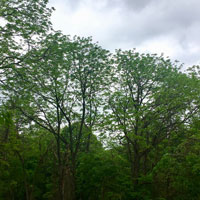
Bringing Back Butternut Trees
/ Andy KubisView the page for this story
Butternut trees, also known as white walnuts, used to be abundant in the forests of the Northeast and the Midwest, but have now been devastated by a fungus. As the Allegheny Front’s Andy Kubis tells us, help for this struggling species may soon be at hand. Ecologists in Pittsburgh, Pennsylvania recently found a small group of healthy butternuts and are studying how these hardy trees resisted the fungus. (04:00)
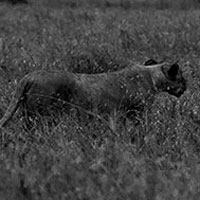
Night Moves
/ Mark Seth LenderView the page for this story
When the sun sets in Africa, a pride of lions relies on more than just sight to communicate. Living on Earth’s Explorer-in-Residence Mark Seth Lender tells of how African lions who hunt together trade their unique roars amid the nighttime hours. (03:09)
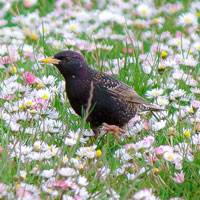
BirdNote®: Starlings Say It With Flowers
/ Michael SteinView the page for this story
European Starlings can often be found scrounging through the grass of a backyard or a nearby park for tasty treats. But now and then, they’ll also pluck a marigold or other bright flower to bring back to the nest. These flowers aren't just for decoration, as Michael Stein explains in this week’s BirdNote. It appears to bring health benefits to their young. (01:59)
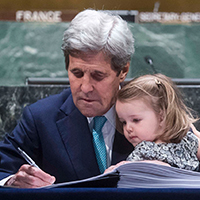
John Kerry: ‘Respect Democracy – By Going Out And Voting’
View the page for this story
As Secretary of State under President Obama, John Kerry made climate change one of his top priorities and played a key role in the success of the Paris Agreement. Now, as the Trump Administration walks back climate policies and the world grapples with dire warnings from scientists, Kerry says human society and life itself are imperiled. But he’s not without hope and urges American citizens to bring about change through the power of voting. In this second half of our featured conversation, Kerry and Host Steve Curwood discuss the climate challenge, Kerry’s memoir, Every Day Is Extra, and why the 74-year-old is far from ready to retire from public life. (13:01)
Show Credits and Funders
Show Transcript
HOST: Steve Curwood
GUESTS: John Kerry, Michael Oppenheimer, Pat Parenteau
REPORTERS: Peter Dykstra, Andy Kubis, Mark Seth Lender, Michael Stein
[THEME]
CURWOOD: From Public Radio International – this is Living on Earth.
[THEME]
I'm Steve Curwood. Justice Brett Kavanaugh has a long history of ruling on environmental issues that could tip the balance on the Supreme Court.
PARENTEAU: Kavanaugh is one of those judges that requires really clear, explicit direction from Congress when it comes to rules that impose costs on American businesses. And he's quite strict when it comes to interpreting environmental laws against broad protections.
CURWOOD: Also, just as a major hurricane hits the US, a new and dire climate report from the United Nations.
OPPENHEIMER: The report finds that the challenges are not primarily technological, they aren't even primarily economic, but the real obstacle is a social and political one. How do you get societies organized to reinvent themselves to be independent of fossil fuels.
CURWOOD: That and more this week on Living on Earth – Stick Around!
[NEWSBREAK MUSIC: Boards Of Canada “Zoetrope” from “In A Beautiful Place Out In The Country” (Warp Records 2000)]
[THEME]
Kavanaugh On Environmental Law
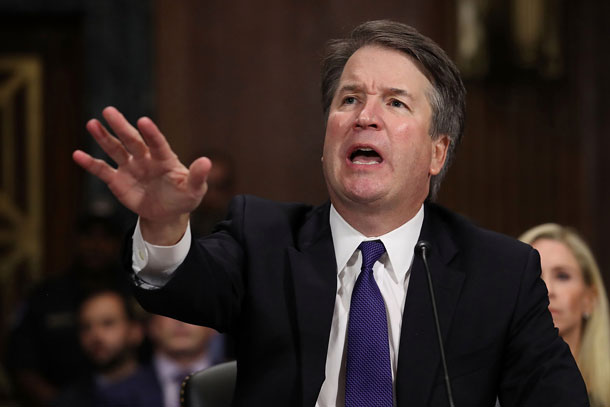
Brett Kavanaugh testifies before the Senate Judiciary Committee regarding claims of sexual assault made against him by high school acquaintance, Dr. Christine Blasey Ford. (Photo: Ninian Reid, Flickr, CC BY 2.0)
CURWOOD: From PRI and the Jennifer and Ted Stanley Studios at the University of Massachusetts Boston this is Living on Earth. I’m Steve Curwood.
With a solid five-four conservative majority now on the US Supreme Court, parties looking to broaden environmental protections under the law can expect plenty of pushback. The bruising and bitter battle to confirm Brett Kavanaugh as the newest associate justice centered more on allegations of sexual assault and temperament than his judicial record. But a close look at Justice Kavanaugh’s rulings during his dozen years on the DC Circuit Court of Appeals reveals strong and well-crafted opinions that restrain government action on pollution and habitat safeguards. To discuss the influence Justice Kavanaugh is likely to have on the high court’s environmental docket, we turn now to Vermont Law School Professor Pat Parenteau. Welcome back to the program, Pat!
PARENTEAU: Thanks, Steve. Good to be with you.
CURWOOD: Now, Justice Brett Kavanaugh has been closely related to a number of environmental cases. Why? Why is that?
PARENTEAU: Well, he's been on the DC Circuit Court of Appeals which is the second most important court to the Supreme Court in the country for going on 11 or 12 years. He's written 300 hundred different opinions of which probably a fourth maybe and dealt with either environmental law directly or administrative law, issues that relate to environmental law. So, he has quite a track record of writing opinions in environmental cases.
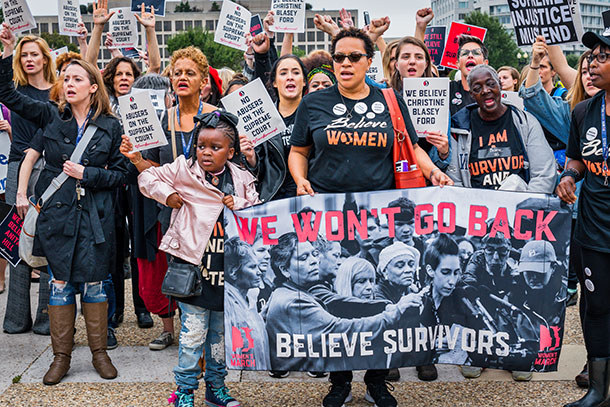
Crowds gathered in Washington, D.C. to protest the confirmation of Brett Kavanaugh to the Supreme Court. (Photo: Mobilus in Mobili, Flickr, CC BY-SA 2.0)
CURWOOD: So, typically how has Justice Kavanaugh ruled on these regulatory cases involving environmental law?
PARENTEAU: Well, he styles himself in the manner of the late Justice Scalia who was a textualist, a strict constructionist, and what that means of course, is that he looks to the text of a statute when he's asked to interpret it, and if the text isn't clear enough oftentimes he will rule against an agency's interpretation. And then in an environmental arena that oftentimes means that rules which are trying to increase the level of protection for public health and the environment don't often fit squarely within the plain text of a statute. The statutes are general and vague. Often agencies try to interpret them as best they can. Kavanaugh is one of those judges that requires really clear explicit direction from Congress when it comes to rules that impose costs on American businesses. He's quite pro-business and he's quite strict when it comes to interpreting environmental laws against broad protections.
CURWOOD: So, what's an important or an outstanding case that Brett Kavanaugh has ruled on regarding the environment from his perch in the Circuit Court of Appeals?
PARENTEAU: Well, he recently ruled that EPA does not have the authority to require a substitute chemical that's used in refrigerants and fire prevention devices that is a very potent greenhouse gas. The chemical was adopted because it doesn't deplete the ozone layer, so it was one of these non ozone depleting chemicals, but the problem is that it's a terrible greenhouse gas, and EPA tried to say, well, we're not going to substitute a greenhouse gas for an ozone-depleter, let's find a different chemical. Kavanaugh looked at the language of the Clean Air Act and said, no, it's limited, EPA's authority is limited to substituting one ozone-depleter for another, but it can't take climate change into account when it looks at alternatives. That's kind of a convoluted case, but that's an example of a very strict approach to interpreting the law, the net result of which is that they're very virulent greenhouse gas is now on the market that was supposed to be a remedy for ozone depletion, but now it's going to cause climate change.
CURWOOD: And what does this do to the balance of the high court in your view?
PARENTEAU: While it solidifies the conservative wing with the Gorsuch section Kavanaugh appointments, it's now clear that on any of these really close statutory questions, constitutional questions, the balance of the power on the court which we've seen a number of times - the Massachusetts vs EPA case ruling that greenhouse gases were a pollutant under the Clean Air Act was a five to four decision - there have been any number of really important five to four decisions involving environmental laws, and now that conservative wing that strict approach wing is in control, solidly in control for at least a generation.
CURWOOD: So, which environment related cases are coming to the High Court in the near future, and how do you expect Justice Kavanaugh to vote, to rule in those cases?
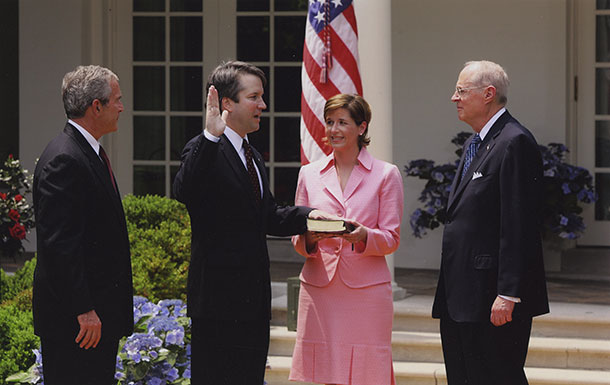
Kavanaugh is sworn into the D.C. Circuit by Justice Anthony Kennedy in 2006. Kavanaugh served as a judge on the D.C. Circuit for 12 years where he encountered many cases regarding the Clean Water Act and Clean Air Act. (Photo: whitehouse.gov, Wikimedia commons, public domain)
PARENTEAU: They have a very important Clean Water Act case pending. It's out of Hawaii, and it involves the underground injection of sewage which then gets right into the ocean waters, and the question is whether or not when you inject the waste into groundwater which then goes into the surface water, does that require a permit? The Ninth Circuit said yes, the county of Maui in Hawaii has asked the Supreme Court to review it, it will probably come up in the next what they call a conference of the justices coming up very soon, and now that Kavanaugh's there he'll have a chance to vote to review it. It's exactly the kind of case where the question is going to be, how broadly do you interpret the reach of the Clean Water Act, you interpret it narrowly to mean there has to be a direct discharge of the pollutant to the surface water or can it also include an indirect discharge via groundwater. So, it's it's a classic case where you can expect Kavanaugh to rule against a broad interpretation of the Clean Water Act.
CURWOOD: What does a confirmation of Justice Brett Kavanaugh mean in terms of the United States dealing with the threat of climate change global warming in the years ahead?
PARENTEAU: Oh, I think we have to be realistic. If we're going to make any progress on climate change in the United States, it's going to have to come through the legislative process and that, of course, means a change in the makeup of Congress both the House and the Senate. Under the current majority, there really is no realistic hope, I don't believe, of meaningful action on climate change. It's going to take a major change in electoral politics in the United States. We may begin to see some of that in the mid-term elections in November. Frankly I hope we do, but time is short and I don't think we can rely on the courts in the United States right now to deliver the kind of relief we need.
CURWOOD: What can you tell us about the youth climate lawsuit against the federal government?
PARENTEAU: Well, the good news on that front is that despite the desperate, really, efforts of the Trump administration to stop the trial, it is going to start on October 29, and it is going to take several weeks of testimony. The plaintiffs in the Juliana case our children's trust case have come up with a stellar group of experts, scientists, economists, technology experts. So, they have a very strong powerful case to present. We haven't seen what the Trump administration is going to present by way of a case because they've been desperately trying to run away from this trial and not show up.
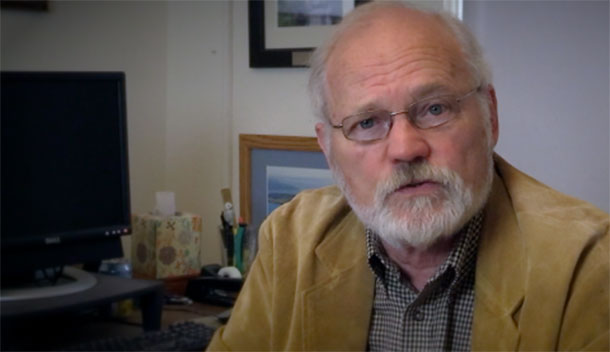
Pat Parenteau is a Professor at Vermont Law School and is currently serving as a Fulbright Fellow in Ireland. (Photo: Vermont Law School)
But I don't think there's any way for them to escape. So, we're going to see some pretty dramatic testimony in a court of law solidifying the need for immediate action, and it's coming at exactly the right time with the elections coming up, the 2020 elections right around the corner, I think we're going to see for the first time a really robust cross examination tested evidence of what exactly we need to do and how we can do it. The important thing of course is not how bad is the situation, but are there solutions. Can we actually accomplish the things that we need to do, and the answer to that is yes we can. If we get busy right away and work as hard as we can, we can do it, say many many experts. So, the trial I think is going to be a showpiece of what we can do and must do.
CURWOOD: Let's say that the youth climate lawsuit against the federal government prevails at the trial level. What chance is there that a ruling from the lower court saying that the government has to act would be upheld by the present Supreme Court we have?
PARENTEAU: Well, I suppose conventional wisdom would say the odds are against that. I think you could probably look at maybe winning in the Ninth Circuit, but it's hard to see five votes for some of the theories that the youth plaintiffs are advancing that there's a constitutional right to a sustainable climate. The current state of the law is not what we need and not where we need to be, and it may well be that this unprecedented threat of climate change will itself change the law. It's certainly a Brown versus Board of Education moment in our constitutional history. Maybe the Supreme Court even as conservative as it is would be up to that. I suppose you could say it's doubtful that it is, but on the other hand, nothing ventured nothing gained. I think I'm at the point and a lot of frankly law professors and lawyers are at the point of saying we don't have any other options. We've got to push this argument as far as we can possibly push it and hope for the best.
CURWOOD: Pat Parenteau is a professor at Vermont Law school and this fall a Fulbright fellow. Thanks so much for taking the time with us today.
PARENTEAU: Thanks, Steve, I enjoyed it.
Related links:
- Reuters | “US Top Court Rebuffs Appeal of Kavanaugh Ruling Nixing Climate Rule”
- LegalPlanet | “Judge Brett Kavanaugh’s Record on the Environment”
- About Vermont Law School Professor Pat Parenteau
[MUSIC: Dana Robinson, “Crossing the Platte” on National Parks soundtrack]
Beyond The Headlines
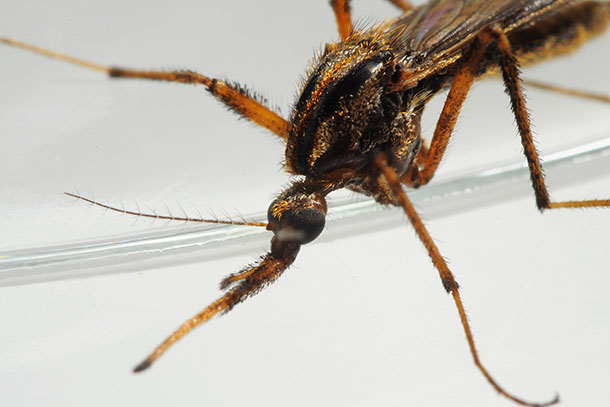
Colloquially called “gallinippers,” Psorophora ciliate mosquitos are particularly large and vicious biting insects. In the aftermath of Hurricane Florence, North Carolina is suffering from an enormous mosquito outbreak. (Photo: Ben Seese, Flickr, CC BY-NC-ND 2.0)
CURWOOD: Well, it’s time now to take a look behind the headlines, and we turn to Peter Dykstra. Peter’s an editor with Environmental Health News, that’s EHN.org, and DailyClimate.org. On the line now, from Atlanta, Georgia – what’s going on down there in Georgia, Peter?
DYKSTRA: Hi, Steve. Well, we’re going to talk about what’s going on a few states away in North Carolina. We’ve talked a lot about the aftermath of Hurricane Florence, just because there’s so much aftermath, and today we’re going to discuss gallinippers.
CURWOOD: Gallinippers? What’s that?
DYKSTRA: It’s a not-too-affectionate name for a particularly huge and ferocious mosquito species that turns up in the Middle Atlantic this time of year. They’re having a huge outbreak after the rains associated with Florence. Gallinippers give a more painful bite than other mosquitoes, they’re much bigger, and they can even drill down into cattle hides.
CURWOOD: Ew, ouch! Boy, I don’t know about that. So, what are they going to do?
DYKSTRA: Well, there’s been a bumper crop this year. The governor of North Carolina authorized 4 million dollars to combat the unusual mosquito outbreak, and, of course, that means the spraying of pesticides.
CURWOOD: Oh, great, so you get the choice of what? A bite that can go through cow hide, or getting exposed to something that could cause cancer?
DYKSTRA: Or both.
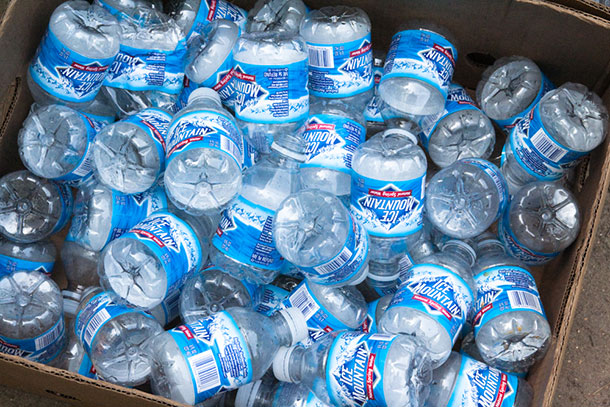
Declining sperm count – especially in industrialized nations – has been linked to endocrine disrupters such as Bisphenol A, commonly found in water bottles and the linings of canned food. (Photo: Steven Depolo, Flickr, CC BY 2.0)
CURWOOD: What else do you have for us today?
DYKSTRA: Well, there’s been much ado about sperm counts in recent years. A marked decline is showing up in studies of up to 50 percent of human sperm counts in developed nations over the past several decades. The decline doesn’t show up as much in non-developed nations.
CURWOOD: So, what’s the reason here, what’s going on?
DYKSTRA: There are several potential causes. Obesity is one, lousy diets in the West…but there’s a particular focus on the use and dispersion of chemicals, particularly endocrine disrupters like BPA, Bisphenol A, the plastics additive.
CURWOOD: Hmm, so everywhere in the Western industrialized nations, huh? Lower sperm counts.
DYKSTRA: Yeah, there’s one place that in one study, rated an exception. Nobody knows why, but for some reason, in New York City, a study said the sperm counts are not declining like they are in the rest of the Western world.
CURWOOD: Huh, what do you think New Yorkers are doing that’s different?
DYKSTRA: Uh, bragging? I don’t know.
CURWOOD: Hey, what do you have for us from the history vaults this week?
DYKSTRA: October 1982, and let’s go back once more to North Carolina: the birth of the environmental justice movement. There was a month’s worth of marches and protests in Warren County, North Carolina. They were protesting a plan to site the state’s first hazardous waste dump. It’s a predominantly Black and poor county.
CURWOOD: So, what happened in that? Did North Carolina put the toxic waste dump there, or not?
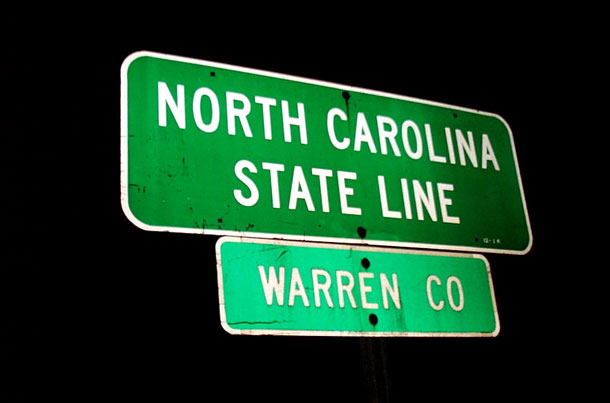
Warren County, North Carolina is regarded by many as the birthplace of the environmental justice movement in the United States, stemming from a series of protests of a proposed PCB landfill in October of 1982. (Photo: Taber Andrew Bain, Flickr, CC BY 2.0)
DYKSTRA: The protests came together with icons from the Civil Rights Movement from all over the country. One of those icons, Floyd McKissick, was from Warren County. They came together and began to realize that dumping on poor and minority communities across the country was commonplace. Governor Jim Hunt responded to the protests by cancelling plans for the toxic waste dump, Warren County became the first, the environmental justice movement was born.
CURWOOD: Thanks, Peter. Peter Dykstra is an editor with Environmental Health News, that’s EHN.org, and DailyClimate.org. Thanks so much, we’ll talk to you again next time.
DYKSTRA: All right, Steve, thanks, we’ll talk to you soon.
CURWOOD: And there’s more on these stories at our website, LOE.org.
Related links:
- Wired | “Swarms of Supersized Mosquitoes Besiege North Carolina”
- Vox | “Sperm Counts Are Falling. This Isn’t the Reproductive Apocalypse — Yet.”
- Daily Mail | “Sperm Counts Are Plummeting Everywhere – Except in NYC”
- The Washington Post | “Dumping on the Poor”
[MUSIC: Jan Johansson, “Ganglek Fran Alvdalen” on Folkvisor – Jazz På Svenska, Heptagon Records]
CURWOOD: Coming up little known and in trouble. Arborists race to save the butternut tree. Just how is ahead on Living on Earth.
ANNOUNCER: Support for Living on Earth comes from the Gordon and Betty Moore Foundation and from a friend of Sailors for the Sea, working with boaters to restore ocean health.
[CUTAWAY MUSIC: Django Reinhardt Festival, “New York In November”]
Global Warming Is Heating Up
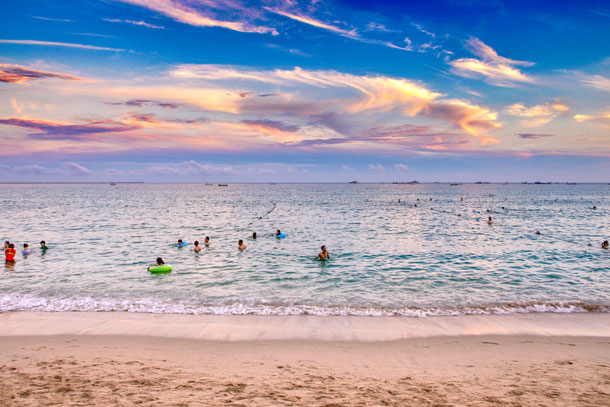
The newest Intergovernmental Panel On Climate Change Special Report details what even a half degree of additional planetary warming would mean for societies around the world. (Photo: See Ming-Lee, Flickr CC-BY-NC 2.0)
CURWOOD: It’s Living on Earth. I’m Steve Curwood.
Hurricane Michael quickly blew up into a devastating Category 4 storm as it entered warm waters in the northern part of the Gulf of Mexico. It’s yet another example of the increasing number of major weather events linked to climate disruption. And according to a recent report from scientists with the Intergovernmental Panel on Climate Change, the IPCC, we can expect more and more dire events such as Michael with only seemingly small increases in the globe’s average surface temperatures. The 2015 Paris Climate Agreement called for no more than a 2-degree centigrade increase from pre-industrial conditions and suggested limiting the rise to 1.5 degrees would be beneficial, but this new report finds that half degree difference poses huge risks. Keeping below that 1.5°C goal is going to be tough, but the impact of failure will be even tougher, says Princeton Professor Michael Oppenheimer. Professor Oppenheimer has been a lead author for IPCC reports for years and joins us now. Welcome back to Living on Earth Michael!
OPPENHEIMER: Glad to be here again.
CURWOOD: Let me cut to the chase. How scared are you by this latest report from the IPCC?
OPPENHEIMER: I don't get scared about this issue because I've been living with it for 35 years, and if it scared me I would have gone crazy a long time ago. However, any sane person would take away a very very sobering message upon reading this report. The effects of climate change are already here. They are projected to worsen over time and the point at which the risks related to climate change, that is that the possibility of very big impacts starts to increase markedly, is not toward the end of this century, but very close, a matter of a decade or two away, if we do nothing or more or less nothing like we're doing now to reduce the emissions of the greenhouse gases that are causing the problem.
CURWOOD: So, what's the basic premise of this report, and why was it issued in the first place?
OPPENHEIMER: This report has an unusual origin. The Intergovernmental Panel on Climate Change produces thorough assessments of all our knowledge on climate change every six years or so. And then in between those major assessments, it produces very quick and pointed assessments of pieces of the problem. For instance, I'm working on the next - these are called special reports - and I'm working on the next special report which is on the oceans and the icy parts of Earth like the ice sheets. The report that just came out is on the question of what is the level at which we should restrain warming in order not to enter a danger zone with the risk just so high that we may just as a group of societies not be able to cope with it. That's unusual because it's pointed at a single very specific issue that has high policy relevance.
CURWOOD: Now, one of the headlines from this latest IPCC report is that we have just a dozen years, 12 years or until 2030 or so to get our act together to reach a net zero output in carbon emissions. To what extent do you agree with that finding and how do we possibly get there?
OPPENHEIMER: To be frank about it, I don't think we're going to get there, and I also think that, partly because of that the framing that we have 12 years left or else is wrong. It's counterproductive, it will just scare people. The report doesn't frame it that way that's been a framing that the media has put on it, sort of like 12 years of we don't do we should do, the world comes to an end. That's not the case. The reality is at every step you do the best you can and if you don't quite make the target, you try to do a little better in the next decade or the next couple of decades. The world doesn't come to an end because of this. The risk just increases markedly and it becomes very very hard to cope eventually. That doesn't mean that societies will completely disintegrate. Some will. I can tell you that sea level rise is going to destroy some coastal societies particularly on small island states, but it will make life just miserable, expensive, and uncomfortable for the rest of us.
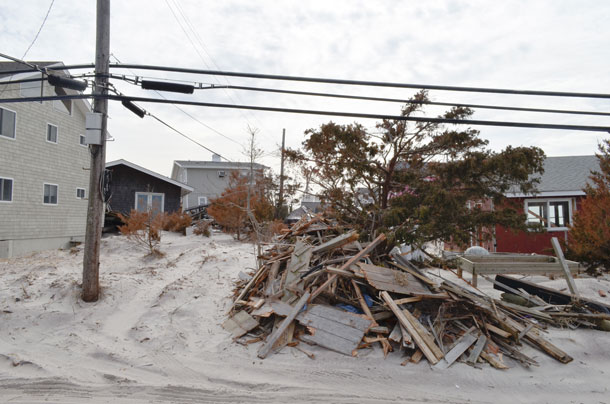
Hurricane Sandy debris on Fire Island in New York. Strong storms like this one will become more common with increased ocean warming. (Photo: USACE NY, Flickr CC-BY-NC 2.0)
CURWOOD: So, what are the biggest challenges in this report in terms of limiting warming to a degree and a half centigrade?
OPPENHEIMER: Contrary to what most people think, the report finds that the challenges are not primarily technological. The costs are going to be decreasing over time, although they're never going to be entirely negligible. But the real obstacle is a social and political one. How do you get societies organize to actually reinvent themselves to be not independent of fossil fuels?
CURWOOD: You're saying the primary challenge is to limit warming to 1.5 degrees Centigrade is us. What in fact do we need to do then as societies, as governments, to limit this warming. I know there are many many aspects to it, but briefly, what do we need to do?
OPPENHEIMER: At the most general level what we need to do is abandon using fossil fuels as primary energy sources. That means getting rid of coal the primary source of carbon dioxide from electric power production, for instance, as soon as possible, reducing and eventually eliminating our dependence on petroleum based products like gasoline primarily for transportation and probably the biggest challenge is that there's so much carbon dioxide already in the atmosphere that even if we slow down markedly and eliminate our dependence on fossil fuels, we probably need to find a way to remove some of that carbon from the atmosphere eventually. Not immediately, but as we get toward mid century it seems we're going to need a way to suck the carbon dioxide out of the atmosphere, and people are working on that. So, those are two things. The third thing is becoming more efficient, and that means not just efficiency in production, it also means societies organizing themselves efficiently. For instance, in the United States, we have a very spread out pattern of development and that pattern automatically guarantees high energy use.
CURWOOD: So, tell us why two degrees Centigrade would be even worse than the already ambitious goal of 1.5 degrees Centigrade. Why does just half a degree make such a difference according to this particular report?
OPPENHEIMER: So, when the report was called for in 2015, a lot of scientists were skeptical that there would be much of a difference in the impacts between 1.5 and two degrees, but because of the government's call for the report, a lot of scientists went out and started doing a research focus specifically on the difference between 1.5 to two degrees. It's become clear that particularly with regard to extreme heat and flooding that there are big differences between 1.5 and two degrees. Let me give you an example. Already by 1.5 degrees there are places particularly islands in the Pacific and mega cities all around the world for which the incidence of the benchmark hundred-year storm or hundred-year flood event I should call it, increases markedly even by 1.5 degrees so that you're getting at that level what is today a hundred-year event becomes a yearly event. Think about that. We don't deal with those kinds of events effectively now even though they are very rare. What happens when they're happening all the time?
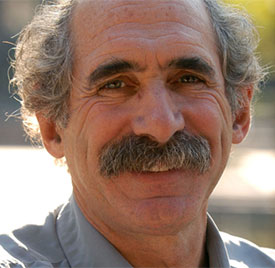
Michael Oppenheimer is a professor at Princeton University and a frequent lead author for IPCC reports. (Photo: Courtesy of Princeton University)
CURWOOD: What's missing from this report and tell me why?
OPPENHEIMER: There really isn't much of a social and political analysis. There isn't much discussion of the political and social obstacles. There is discussion of the need for transformation, but not that much discussion of how you go about it in particular places and why it's difficult to do. And the reasons for that are, number one, it's different in every place. The IPCC can't do a special report for every place on Earth, and number two, many political leaders have regarded this as an unpopular thing to do, and they don't want to start digging into some of these very basic political reasons. So, IPCC did the best they can do given its charge.
CURWOOD: What gives you hope? What makes you an optimist, Michael Oppenheimer, about climate disruption?
OPPENHEIMER: The most optimistic thing is that we've seen a revolution start to happen in the energy system of the world. and particularly the US where coal for reasons that have nothing to do with climate change by and large is decreasing in importance as a fuel in the US and increasing penetration of renewable energy into the market. We're seeing rapid development in the storage capacity, particularly for electricity. So, we're in the middle of that revolution now, and with some push from government both on the regulatory front and on the research and development front, we can make this happen even faster than it's happening right now. So, there's one reason for optimism. Another is if you step back and look at human history, human beings are very clever at creating dangerous messes and then almost as good as cleaning them up afterwards. The analogy which is the most promising one, is what happened with the nuclear arms race where we haven't put the genie back in the bottle, and something could still go wrong, but we significantly reduced the risk of a large scale nuclear exchange, which is essentially making the Earth uninhabitable. And so, you know, you can look at that as, what, is that encouraging. And I think yes it is. That human beings are smart sometimes and are able to see their mistakes and act collaboratively as countries in the same soup to get out of the soup.
CURWOOD: Michael Oppenheimer is a Professor of Geosciences and International Affairs at Princeton University. Thanks so much for taking the time with me today.
OPPENHEIMER: Thanks for having me here today, Steve.
Related links:
- Draft Summary of the October 2018 IPCC Report
- Climate Futures Initiative at Princeton University
- Michael Oppenheimer Academic Profile
[MUSIC: Jose James, “Hope She’ll Be Happier” on Lean On Me, by Bill Withers, Concord Blue Note Records]
Bringing Back Butternut Trees
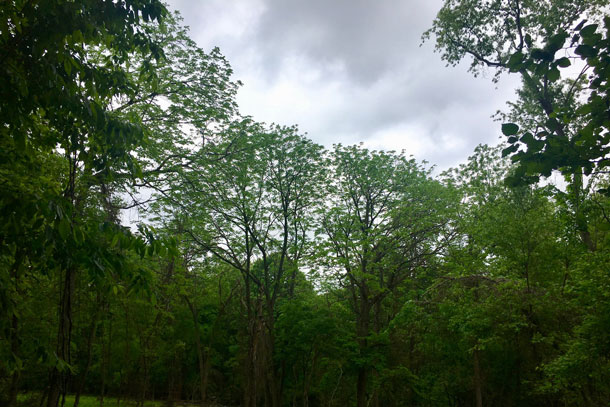
A stand of healthy butternut trees, untouched by canker fungi. (Photo: Andy Kubis)
CURWOOD: Butternut trees are sometimes called white walnut trees, and yes, their nuts are delicious. They are common across the eastern US, but now they are now threatened by a deadly fungal disease. In some areas it can be hard to find one that’s not already affected. And that is why ecologists at the Pittsburgh Parks Conservancy were so excited by a recent discovery in a local park. From the Allegheny Front, Andy Kubis has our story.
KUBIS: The forest behind the Frick Environmental Center is lush. But walk about 500 feet along the Clayton Hill trail and you come to a clearing.
JUDITH: It looks a little bit shocking when you first see it ... every open space you see there used to be a tree.
JUDITH: This is Judith Cook. She coordinates volunteer landscape projects for the Pittsburgh Parks Conservancy. Cook worked on a restoration project in this area of the park all winter. The original plan was to get rid of a giant stand of invasive honeysuckle that had taken over.
JUDITH: This whole area, you couldn't see anything. It was just really a wall of Honeysuckle. It was so crazy.
KUBIS: The honeysuckle in this patch of forest likely escaped from someone’s yard and had been growing, unchecked, for about two decades. But once it was cleared, the parks staff found a pleasant surprise.
Ten strong, full-grown butternut trees. Cook stands in the clearing and points up to one.
JUDITH: So here’s a perfectly healthy butternut, that I’ve never really seen before in Pittsburgh parks. Growing perfectly fine in our woodlands, the way they’re supposed to.
KUBIS: You rarely find a healthy butternut because of a deadly, exotic fungus that causes a fatal disease called butternut canker. In some states, 80% of the butternuts have already died.
The trees - also known as white walnuts - used to be widespread in Pennsylvania’s forests, and their nuts are an important food source for wildlife. When a butternut gets canker, it develops an oblong -shaped abscess that oozes. The wounds eventually cut off the tree’s nutrient supply, and it dies. According to the Parks Conservancy, every butternut in Frick Park shows symptoms of the disease – except for these newly uncovered ones. That’s why it’s such an important discovery.
JUDITH: There are just so many threats to our native trees that seeing trees that are not diseased, that are withstanding something that is spreading throughout the country and taking out entire species -- that is a big deal to us.
I’m not sure if it’s such a big deal to the public though.
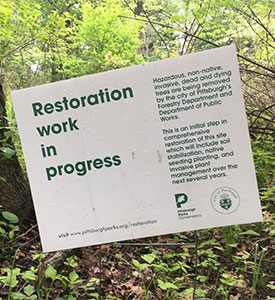
Restoration of these native trees led to the discovery of 10 healthy trees within Frick Park. (Photo: Andy Kubis)
KUBIS: What’s your best guess for why these don’t have canker?
JUDITH: We don't really know why they don’t have canker. The reason why we’re interested in them is we are interested in their genetic makeup. We want to see if they are maybe not susceptible to the canker or just a little bit stronger than other butternuts.
KUBIS: The healthy butternuts will be closely monitored for the next couple years for any signs of the fungus. If they remain canker-free, parks staff will collect their DNA and add it to a genetic database of the city’s strongest trees. And they’ll also grow new trees that will be used to re-populate this site.
For now, the hard work of forest restoration continues.
[Chainsaw Sounds]
KUBIS: Today, there’s a chainsaw to help. But often it’s just a lot of old-fashioned hand-weeding to keep the site free of invasives – like that pesky honeysuckle that is already trying to creep back.
KUBIS: What's next here. What are you going to be looking for and what are going to be doing?
JUDITH: We will continue going out here with interns and with volunteers and with staff and removing as many invasives as we can as they are regrowing, so ideally in two to three years we can start planting restoration trees on the site to start filling in the canopy.
KUBIS: Cook says the project will take at least 10 years. But when they’re done, the tree canopy will be closed - they hope - by a bunch of healthy canker-free butternut trees.
JUDITH: That is like one of the greatest things about Pittsburgh, that we are so green. And we have so many parks. So it's really important to preserve them and make them stronger.
CURWOOD: That story from Andy Kubis comes to us courtesy of the Allegheny Front.
Related link:
Read this story on the Allegheny Front’s website
[MUSIC: Jose James, “Lean On Me” on Lean On Me, by Bill Withers, Concord Blue Note Records]
Night Moves
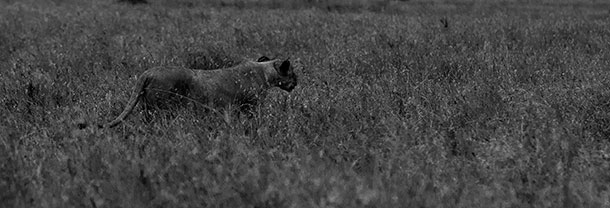
The hunt begins. (Photo: Mark Seth Lender)
CURWOOD: On the African savannah we might think the lion is king, or queen, but our explorer in residence Mark Seth Lender says it’s actually much more complicated than that.
LENDER: On the equator Night swallows the sun. Throughout Day sun lingers, hardly seeming to move at all. Then, the steep angle of descent. All at once. From Heat to Cool of Dark in a quarter of an hour.
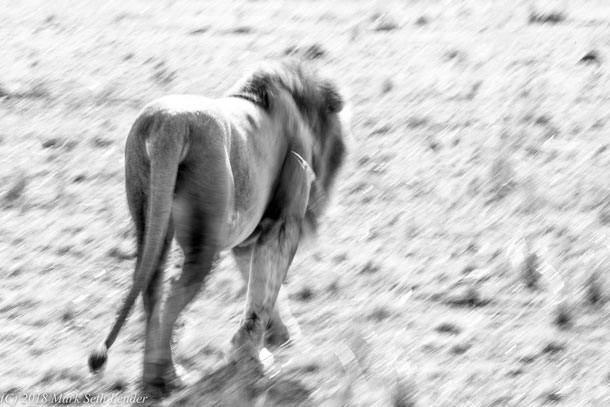
An African Lion hunts at dusk. (Photo: Mark Seth Lender)
Even at the narrow angle that now obtains the lioness would rather be somewhere else. She yawns. And yawns again. And stands up. And stretches, all the way out. And changing places barters what heat remains for shade. She walks with her eyes closed, blinks, lies down and shuts her eyes again. Her day’s work will start only when the last glow vanishes and blackness rules. She and her sisters. The ones who do the killing.
Two males plunk themselves down nearby, side by side, their manes only a suggestion like the facial hair of teenage boys. They rub muzzles and one grooms the other with his rough pinkish-purple tongue. Housecats, except for the size of their paws. As sometimes occurs, they will prove the exception to the female prowess that governs the fate of the pride. They will become hunting partners for life, as formidable as anything or anyone out there. They hold back their claws, and wait.
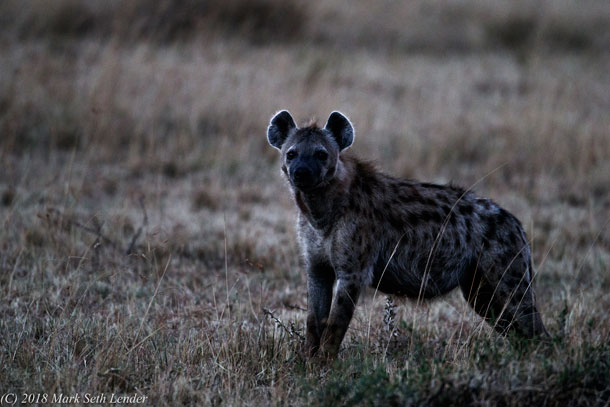
The hyena waits, and watches. (Photo: Mark Seth Lender)
Finally the tree frogs start. They are the ones who decide Night has begun. It is a sound like small high bells but loud. The spotted hyena who camp nearby take this as their downbeat. Whuup! Whoooooo-up! Whatever they are after stands little chance.
The leopard roars, the volume turned down but more than enough to make the point and he is very close.
The pride heads out…
A black-backed jackal barks.
And now, off somewhere in the open plain beyond the trees, now at last the lions begin. A deep huffing cough, Errrrauuh, Errrauuh, Errrr – rah, ah, ah, ah… It is hard to figure out exactly where its coming from and that’s the point of it. Only the lions and the lionesses know. And the hunted in their panic will run right into one or the other of them.
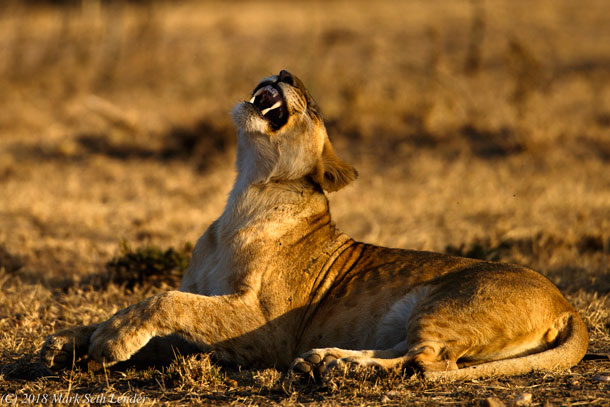
A lioness lets out a big yawn. (Photo: Mark Seth Lender)
Late into the night, the jackal goes on barking and barking…
CURWOOD: Mark Seth Lender is Living on Earth’s explorer in residence. For more, including photos, go to our website LOE.org.
Related links:
- Read Mark Seth Lender's Field Note on his essay "Night Moves"
- Mark Seth Lender's Website
- Special thanks this week to Donald Young Safaris
[MUSIC: Mariam With Djelimady Tounkara on “Throw Down Your Heart”]
CURWOOD: Coming up – Former Secretary of State John Kerry on the dividends of environmental conservation. Keep listening to Living on Earth.
ANNOUNCER: Funding for Living on Earth comes from you our listeners and United Technologies, combining passion for science with engineering to create solutions designed for sustainability in aerospace, building industries, and food refrigeration. UTC companies such as Otis, Carrier, Pratt and Whitney, and UTC Aerospace systems are helping to move the world forward. You can learn more about United Technologies by tuning into the Race to Nine Billion podcast; listen at race to nine billion dot com. That’s race to nine billion dot com. This is PRI, Public Radio International.
[CUTAWAY MUSIC: Jose James, “Hello Just Like Before” on Lean On Me, by Bill Withers and John Collins, Concord Blue Note Records]
BirdNote®: Starlings Say It With Flowers
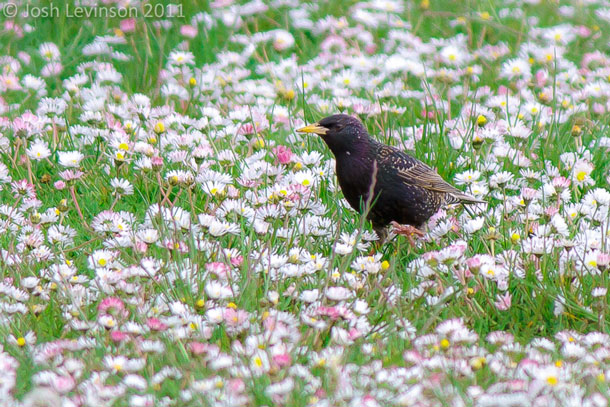
The European Starling is thought to adorn its nest with flowers to ward off pests. (Photo: Josh Levinson)
CURWOOD: It’s Living on Earth. I’m Steve Curwood.
[MUSIC: BIRDNOTE THEME]
CURWOOD: European Starlings famously travel in massive flocks, up to one hundred thousand birds strong at times. They can almost resemble a school of fish moving together in a squeaky symphony. And, Bird Note’s Michael Stein reports that when starlings are paired up and raising chicks they have an unusual way to keep their nest clean and healthy.
STEIN: European Starlings are a common sight in suburban yards, waddling methodically through the grass to dig for grubs and other tasty bits. Watch long enough, though, and you may see a starling pause in the hunt to neatly pluck a marigold or other bright flower – and then fly up to deposit the bloom in the nest.
How romantic. But there’s more to it. Ornithologists have found that starlings regularly adorn their twig nests with fresh vegetation – the more fragrant the better. Marigolds, of course, but also elderberry flowers, yarrow leaves, and even willow bark.
All of which – as your nose will tell you – are full of aromatic chemicals. The starlings are actually fumigating their nests. Why? The chemicals have been thought to help discourage pests and parasites. Scientists have discovered that the smelly plants may offer an even more direct benefit to nestlings – by stimulating their immune systems.
It turns out that starlings hatched in well-fumigated nests tend to weigh more and live longer than those raised without benefit of fragrant herbs.
The gift of flowers: romantic and practical all at once. I’m Michael Stein.
Written by Rick Wright
Bird sounds provided by The Macaulay Library of Natural Sounds at the Cornell Lab of Ornithology, Ithaca, New York. European Starling [206992] by Greg Budney.
BirdNote's theme music was composed and played by Nancy Rumbel and John Kessler.
Producer: John Kessler
Managing Producer: Jason Saul
Associate Producer: Ellen Blackstone
European Starling in flowers © Josh Levinson facebook.com/JoshLevinsonPhotography/
© 2005-2018 Tune In to Nature.org October 2018 Narrator: Michael Stein
https://www.birdnote.org/show/starlings-say-it-flowers
CURWOOD: For photos, flock on over to our website loe.org
Related links:
- Learn more on the BirdNote website
- The European Starling at The Cornell Lab of Ornithology
[MUSIC: Kohala, “Deeper Blue” Mele O Hawaii, Sony/BMG]
John Kerry: ‘Respect Democracy – By Going Out And Voting’
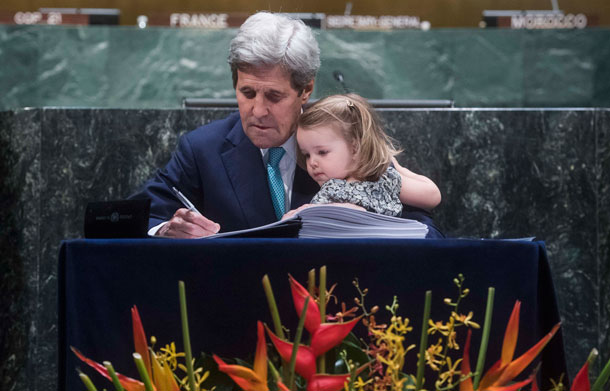
On Earth Day, April 22, 2016, then US Secretary of State John Kerry signed the Paris Agreement as his granddaughter Isabelle looked on. (Photo: UN Photo/Amanda Voisard, Flickr CC BY-NC-ND 2.0)
CURWOOD: We continue our conversation this week with John Kerry, whose memoir is called, Every Day Is Extra. In it the former Secretary of State and Democratic Presidential Nominee writes about his formative childhood years, and his legislative and diplomatic work on climate change, acid rain, and much, much more. And if you missed the first part of our conversation, you can hear it at our website, loe.org. I began the second part of our talk by asking Secretary Kerry to consider the issue of stranded assets as it applies to climate change.
CURWOOD: Let me ask you just to think, reflect on this for a moment. Looking at American history, in 1860, in the south there was more monetary value in slaves than there was in the land. By 1865, that was a classic stranded asset, all that value disappeared. To what extent today do you think we're being held hostage by folks who think that all that fossil fuel in the ground which is on balance sheets at billions and billions and billions of dollars – and it can't all be burned if we understand the science correctly – to what extent are we headed down a path? I mean, to solve the problem that we had with slavery, I mean, is the moral question there? Just like we have today with climate as well as the economic question. To solve that problem we wound up in a pretty, in a very bloody war.
KERRY: Yeah, I mean I don't think that's the choice for America now. I think that I think most of the executives that I know at the higher level of the oil industry are all diversifying. Shell, BP, they're all investing in new energy. They're ready to move where the market would go, and I mean we're not going to be able to transition fast enough that you'd suddenly dry up and not have oil or gas involved. There's going to be oil and gas for a while. It's just the nature of the beast. We've got to try to guarantee it's not for too long. Why? I'm simply listening to the scientists. I mean, I'm listening to and understanding the science. If we don't move off fossil fuels fast enough, we could reach what's called a tipping point where things begin to cascade downwards in a spiral of destruction and dying, of dying seas, dying trees, dying species of various kinds, because it's not sustainable. And if you get into that kind of a spiral nobody knows, nobody can tell you how you break out of it. I'm just applying a precautionary principle to the idea of governing. I mean we buy insurance to make sure if our home burned down we're going to be able to rebuild it. We buy car insurance to fix the wreck and you know life insurance in the event somebody lost a life, the family is OK. Why aren't we buying insurance against the death and destruction that will come with increased storms and increase climate change? It's beyond my understanding why we could have a president who is a denier of this science. Ninety-eight percent of all the scientists in the world who ever watched this and looked at it with peer reviewed studies all say this is happening now, and it's caused by not exclusively but largely by human beings, and if we don't respond to this, whoa whoa to us. We're entering into a sort of suicide pact.
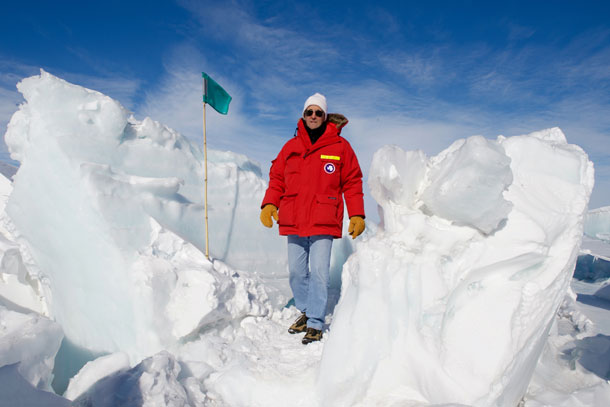
In November of 2016, Secretary Kerry became the highest-ranking United States government official ever to visit Antarctica where he met with scientists from all over the world to learn more about climate change. Secretary Kerry writes, “The scientific evidence presented was compelling and dramatically increased my sense of urgency about the problem.” (Photo: Glen Johnson / United States Department of State)
CURWOOD: It could be worse than the United States Civil War.
KERRY: Well, right now we are heading...the goal in Paris was to keep the rise of the Earth's temperature to two degrees Centigrade, and we were going to try to excite enough nations to become involved that we could meet that standard. We now know at the current rate we're not meeting that standard. We're heading now towards four degrees Centigrade rise in the temperature of the average temperature of the planet. That's catastrophic. You'll have water battles, you'll have refugees moving, you think we have tough migration challenges today. Wait until people can't produce food in various parts of the world. Wait until their water dries up and they're not able to live. What happens when the oceans change and you have a migration away from certain stocks that people have relied on for food and so forth. There are just so many unknowns here. I'm not willing to just throw up my hands and say, oh, someone's going to take care of this because that's just not responsible given the input.
CURWOOD: Back in the day as lieutenant governor of Massachusetts, which is not exactly ordinarily a very exciting position, you made your mark jumping on the acid rain problem. Tell me, what did that teach you about the politics of environmental protection.
KERRY: That reasonable people with a reasonable purpose in public life are able to work together, Republican and Democrat, in order to do things that are good for American citizens. I was a lieutenant governor, but Michael Dukakis allowed me to be the chair of the governor's task force for him. I worked with Governor John Sununu of New Hampshire, I worked with Governor Dick Celeste of Ohio, and we put together, the three of us, an approach drawn up by the way by the American Enterprise Institute, a conservative approach to how you use the market to be able to accomplish something you want to accomplish. And there was a market incentive for people to actually buy and trade sulfur which reduced the amount of sulfur. We got acid rain under control through the system, and then when I was in the Senate, I was able to use that and put it into the Clean Air Act. And so it became part of the national program, so you don't hear about acid rain now. We could do the same thing with climate change if we had the leadership that was willing to recognize the greatest market, the biggest market on this planet is the energy market. It is today. There are four to five billion users. They're going to be about nine billion users in the next 30 years because that's going to be the population of the world and we have the ability through the deployment of sustainable renewable alternative energy to be able to limit our emissions and control climate.

Every Day Is Extra caught public attention on the New York Times Best Seller List. (Photo: Courtesy of Simon & Schuster)
CURWOOD: You write in your book that despite President Trump's rollbacks and attempts to roll back President Obama's signature climate environmental policies, which you helped to create, you remain optimistic. Why?
KERRY: Well, I am optimistic. I'll tell you why. First of all, because living without optimism would be miserable. I don't want to be miserable. But more importantly because I see what's happened in my lifetime, which is what I write about in the book, "Every Day is Extra". I mean, every day is actually a way to have respect for life itself, and for our choices about what we do with each day. And because I was lucky enough with a bunch of friends to come back from a war alive and whole, I felt I had an obligation to use every day to its maximum. It was a gift. Other guys didn't get that gift, and I thought we owed it to them and their legacy as well as to ourselves and our own value system to live a life of purpose, to do something. So, that's what I set out to do and in fact the my book, which is very personal - it's not a secretary of state policy book – it's a journey, it's the description of a personal journey and what I learned from that and what I learned from it is we have every reason to be optimistic. Why? Because we're doing amazing things on this planet. We're breaking new barriers every day in terms of science, in terms of our understanding of things. We are living better. We have a higher standard of living, not withstanding poor people and homeless. We do have a higher standard of living. The severe poverty rate when I was in college was 50 percent of this world. Today it's less than 10 percent for the first time in history. We brought 450 million people out of poverty in China, 400 million in India. Fifteen years ago South Korea was an aid recipient country. Today, it's a donor country. So, I see this transformation taking place. We're curing diseases we never thought we would never cure - smallpox, tuberculosis, polio. I mean, we're doing an amazing job with cancer now with the genome. We have an ability to give specialized cancer treatment. People are living longer, living better and that.
So, the challenge remains, but the ability to meet the challenge is absolutely clear to all of us. So, that's what leaps out at me is that technology will continue to improve life. People can live longer, I hope better, but we're we got to organize ourselves better. We're not making our democracy and our governance choice work effectively, and we've learned through history that the alternatives aren't pretty. We don't want to have a monarchy, we don't want to have a dictatorship, we don't want socialism or communism or whatever I don't believe. I think democracy, our democracy, has unleashed the greatest creativity, the greatest freedom, but people have to respect it by going out and voting. 54.2 percent is not acceptable, and I've been in parts of the world as an election observer in Sudan and the West Bank and Kenya and the Philippines where I've seen people come out and wait 15 hours one day in the hot sun with tanks in some places and guns in the hands of people to vote. And I remember going up to a fellow in Sudan waiting in the heat and long line and I said "Look, I'm really sorry," because I was an observer and I said, "I'm so sorry the lines are long and you have to wait so long to vote." He said, "I waited 50 years to vote." I'll wait whatever it is now that I'm in this line to vote. They will do that. Why don't we?
CURWOOD: So, what's your proudest accomplishment in terms of climate or the environment?
KERRY: You know I been asked that. I have never reduced my public career to one accomplishment. I just don't do that; I can't do that. I'm proud of what I did on climate change, but I'm proud of the Iran nuclear deal that got rid of a nuclear weapon and the capacity to build one, I'm proud of getting chemical weapons out of Syria, and proud of what we did with AIDS in Africa. A program that Bill Frist and I actually started in the United States Senate. I'm proud of getting children's health care into the Senate health care bill.
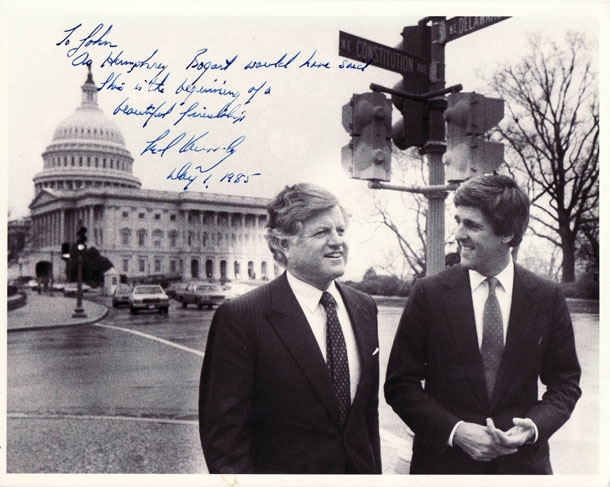
John Kerry with Senator Ted Kennedy, prior to being sworn into the Senate for the first time on January 2, 1985. John Kerry’s friend and senior colleague inscribed the photograph: “To John – as Humphrey Bogart would have said ‘this is the beginning of a beautiful friendship’ Day 1, 1985.” (Photo: John Kerry for Senate)
I'm proud of holding Washington accountable with some of the things I write about in the book, with the exposure of the contra the Iran Contra and the lies that were taking place and Noriega whose money was coming from drugs, coming into the veins of our children in various cities here, proud of what I did the Middlesex DA's office, proud of opposing the war. So, I can't pick one of those things. It's been a continuum. It's been a life's journey, and there's more to come in the sense that I'm not going to stop being a citizen. I'm going to continue to fight for the things that make a difference.
CURWOOD: So, what's next for you?
KERRY: Next I'm going to stay involved. I can't tell you how or what I'll be doing. I'm working with the Carnegie Endowment for Peace International Peace in Washington. Very pleased to be there to be helpful in some international conflict issues. I am teaching course as a fellow on Global Affairs at Yale University and I'm teaching course on American power in the 21 century and the tools of diplomacy and I was writing the book which is pretty time consuming. I'm doing a little bit of private sector business to pay the bills and do things. So, I've got a pretty broad bandwidth right now that's getting filled up fast.
CURWOOD: If people pick up your book they'll be surprised to see how talented you are as a writer. What a nice narrative arc together for this.
KERRY: Well, thank you. So, I think it turned out OK. I think it turned out OK.
CURWOOD: So, what's your secret?
KERRY: Secret to what?
CURWOOD: To writing something like this. It's so readable.
KERRY: I think over the years I've been learning. I'm still learning, but I've been learning how to communicate, how to paint a picture. And I've always done that actually since when I went to Vietnam, I wrote a lot about what I was seeing and observing. I've always enjoyed writing but I've never written that much in a personal way this way. I've written several other books, but they were policy books and it's a very different kind of book. This book is personal. This talks about my faith, talks about my family, talks about my divorce, talks about growing up in a war and opposing the war and tough things, talks about losing the presidency of the United States by one state, and how you turn around and come back from that. I got a really nice note from a guy that had been running for office and he lost, and he wrote me about how he had been reading my book, about how I processed that loss in what I decided to do, and he's found it really helpful. That I love. I mean, that really means something to me.
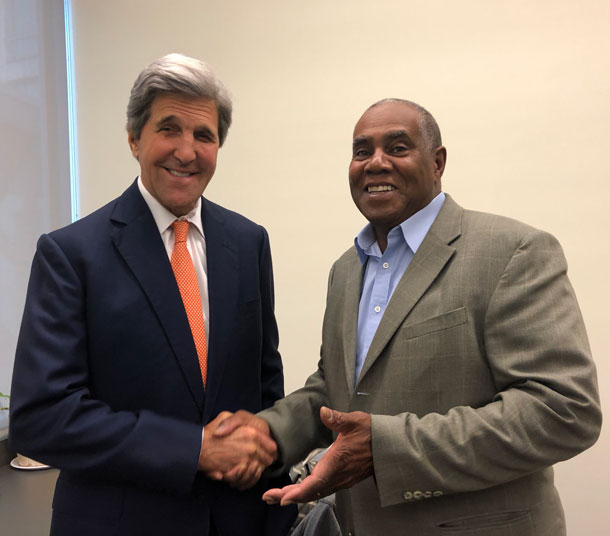
Former Secretary of State John Kerry and Host Steve Curwood. (Photo: Jenni Doering)
CURWOOD: John Kerry's a former Secretary of State, Democratic candidate for President of the United States, a five-term United States Senator from Massachusetts, and his new book is called, "Every day is extra." Secretary Kerry, thanks so much for taking the time with me today.
KERRY: Thank you for a great questions and a really nice conversation. Appreciate it.
Related links:
- Part One of the Conversation: “John Kerry Looks Back – And Ahead”
- Every Day Is Extra
CURWOOD: We leave you this week in the company of some extraordinary creatures and their babies.
[bird calls]
CURWOOD: These are several rhinoceros auklets with their chicks. Recorded at Protection Island National Wildlife Refuge in the Strait of Juan de Fuca off the Pacific Coast.
[bird calls]
CURWOOD: Rhinoceros Auklets are relatives of puffins. They are medium sized dark gray duck-like birds that spend their days at sea and then return at night with fish for their single chick hiding deep in a burrow.
[bird calls]
CURWOOD: Jeff Rice recorded these birds in the middle of a July night with support from the Acoustic Atlas at Montana State University.
[MUSIC: Charles Mingus, “Jelly Roll”]
CURWOOD: Living on Earth is produced by the World Media Foundation.
Our crew includes Naomi Arenberg, Bobby Bascomb, Thurston Briscoe, Savannah Christiansen, Jenni Doering, Jaime Kaiser, Don Lyman, Lizz Malloy, Aynsley O’Neill, Jake Rego, Sarah Rappaport, Adelaide Chen, and Jolanda Omari.
Special thanks this week to Donald Young Safaris.
Tom Tiger engineered our show. Alison Lirish Dean composed our themes. You can hear us anytime at L-O-E dot org, iTunes and Google play- and like us, please, on our Facebook page - PRI’s Living on Earth. And we tweet from @livingonearth. I’m Steve Curwood, Thanks for listening!
ANNOUNCER: Funding for Living on Earth comes from you our listeners and from the University of Massachusetts, Boston in association with its School for the Environment, developing the next generation of environmental leaders. And from the Grantham Foundation for the Protection of the Environment, supporting strategic communications and collaboration in solving the world’s most pressing environmental problems. Support also comes from the Energy Foundation, serving the public interest by helping to build a strong clean energy economy.
ANNOUNCER 2: PRI, Public Radio International.
Living on Earth wants to hear from you!
Living on Earth
62 Calef Highway, Suite 212
Lee, NH 03861
Telephone: 617-287-4121
E-mail: comments@loe.org
Newsletter [Click here]
Donate to Living on Earth!
Living on Earth is an independent media program and relies entirely on contributions from listeners and institutions supporting public service. Please donate now to preserve an independent environmental voice.
NewsletterLiving on Earth offers a weekly delivery of the show's rundown to your mailbox. Sign up for our newsletter today!
 Sailors For The Sea: Be the change you want to sea.
Sailors For The Sea: Be the change you want to sea.
 The Grantham Foundation for the Protection of the Environment: Committed to protecting and improving the health of the global environment.
The Grantham Foundation for the Protection of the Environment: Committed to protecting and improving the health of the global environment.
 Contribute to Living on Earth and receive, as our gift to you, an archival print of one of Mark Seth Lender's extraordinary wildlife photographs. Follow the link to see Mark's current collection of photographs.
Contribute to Living on Earth and receive, as our gift to you, an archival print of one of Mark Seth Lender's extraordinary wildlife photographs. Follow the link to see Mark's current collection of photographs.
 Buy a signed copy of Mark Seth Lender's book Smeagull the Seagull & support Living on Earth
Buy a signed copy of Mark Seth Lender's book Smeagull the Seagull & support Living on Earth

